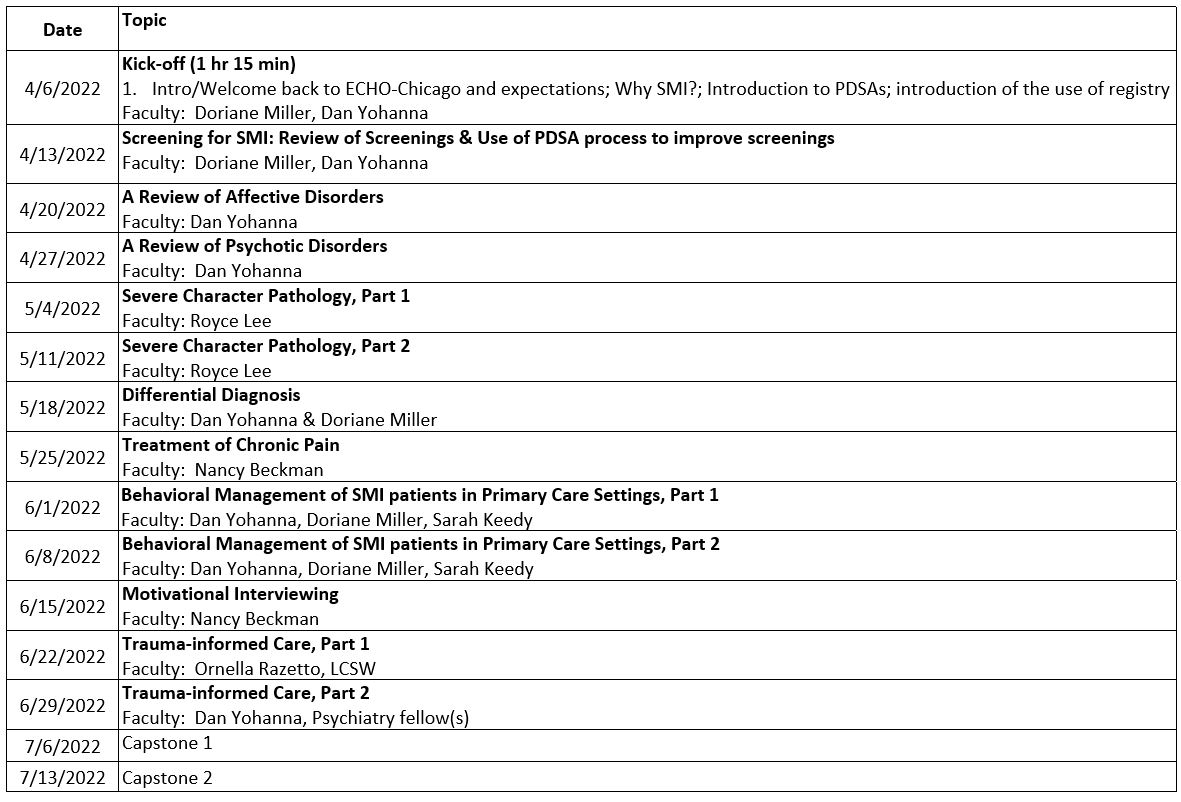
ECHO-Chicago: Serious Mental Illness
Target Audience
Learning Objectives
After this activity, participatants will be able to:
- Identify challenges faced by SMI patients in primary care;
- Outline screening procedures for SMI in a primary care setting and indicate use of quality improvement process to improve screenings;
- State registry components of population health management and how it can be used to track SMI patients;
- Define how screening, brief intervention, and referral to treatment (SBIRT) can be used to treat SMI patients;
- State the best practices for behavioral management including treating comorbid problems like pain and other substance use disorders;
- Summarize how to use motivational interviewing for self-management support of SMI patients;
- Discuss how the recovery model can be used in the treatment of SMI patients;
- State the best practices for treating psychotic disorders;
- Examine the primary care challenges faced when treating affective disorder and appropriate psychological interventions.
- 16.25 AMA PRA Category 1 Credit™
- 16.25 Participation
Agenda subject to change.
WANT TO KNOW MORE?
ACCESSIBILITY The University of Chicago is committed to providing equal access appropriate to need and circumstances and complies fully with legal requirements of the Americans with Disabilities Act. If you are in need of special accommodation, please contact ECHO-Chicago via e-mail via at [email protected].
The University of Chicago reserves the right to cancel or postpone this conference due to unforeseen circumstances. In the unlikely event this activity must be cancelled or postponed, the registration fee will be refunded; however, The University of Chicago is not responsible for any related costs, charges, or expenses to participants, including fees assessed by airline/travel/lodging agencies.
UNIVERSITY OF CHICAGO COURSE DIRECTORS
Disclosure Declarations
As a provider accredited by the ACCME, The University of Chicago Pritzker School of Medicine asks everyone who is in a position to control the content of an education activity to disclose all relevant financial relationships with any commercial interest. This includes any entity producing, marketing, re-selling, or distributing health care goods or services consumed by or used on patients. The ACCME defines “relevant financial relationships” as financial relationships in any amount occurring within the past 12 months, including financial relationships of a spouse or life partner that could create a conflict of interest. Mechanisms are in place to identify and resolve any potential conflict of interest prior to the start of the activity.
Additionally, The University of Chicago Pritzker School of Medicine requires Authors to identify investigational products or off-label uses of products regulated by the US Food and Drug Administration at first mention and where appropriate in the content.
The University of Chicago Pritzker School of Medicine is accredited by the Accreditation Council for Continuing Medical Education (ACCME) to provide continuing medical education for physicians.
University of Chicago Medicine is a Registered Social Work Continuing Education Sponsor through the Illinois Department of Financial and Professional Regulation and will offer continuing education units for the ECHO-Chicago: Serious Mental Illness for LSW and LCSW social workers in the state of Illinois.
Other healthcare professionals will receive a Certificate of Participation. For information on the applicability and acceptance of Certificates of Participation for educational activities certified for AMA PRA Category 1 Credit™ from organizations accredited by the ACCME, please consult your professional licensing board.

Please Note: The credit claiming process will close three months after the conference end date. Requests to claim credit after three months will be subject to additional fees.

 Facebook
Facebook X
X LinkedIn
LinkedIn Forward
Forward